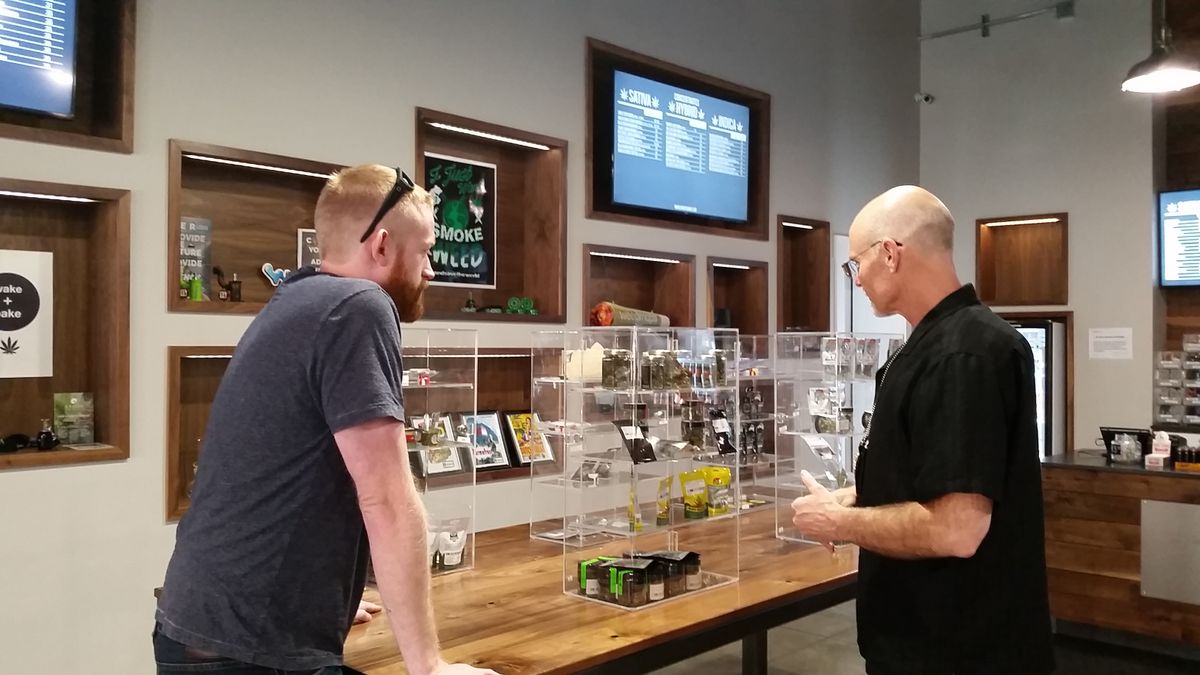Rules are rules, but guidelines can be “subject to interpretation.”
And, in the newly legal cannabis industry, these interpretations sometimes can create confusion for growers, for sellers, and sometimes even for those charged by the State of Washington to ensure everyone follows still-evolving rules.
“We have about 65 Retail Enforcement officers across the state spread over four regions, so, because the rules are still developing, that can sometimes mean 65 different interpretations,” said Lt. Rob Reynolds, who oversees retail marijuana stores for the Eastern Washington offices of the Washington State Liquor and Cannabis Board. This includes locations in Spokane, Pasco, Yakima and Wenatchee.
The LCB focuses on enforcement and education, everything from signing off when a new retailer is ready to open its doors, to answering questions and hearing concerns from owners and the public.
“I spend a good part of my day fielding questions,” Reynolds said.
Officers must visit every store in the region at least three times a year for compliance checks. They also can visit or call other times to answer questions or respond to complaints.
Inquiries regularly come in about advertising, everything from whether images might be targeted to kids or if print advertising uses proper wording.
Shop owners or growers have asked the LCB if they can ‘adopt’ a stretch of highway for litter clean-up (yes) or if they can sponsor a baseball team (probably not, and definitely not a Little League team).
Though education and collaboration are preferred, the LCB can issue fines, make arrests, suspend licenses or even shut down shops if public safety violations are found.
While the state’s liquor laws have pretty much been established for decades, cannabis rules were written from scratch just a few years ago – and have been modified several times since then.
“We’ve had our existing liquor laws on the books for more than 70 years,” Reynolds said. “We’re pretty much adding a new page for cannabis each day.”
Pilot program
Reynolds has worked in law enforcement for 35 years, and for the LCB and its predecessor the Liquor Control Board for the last 14 years.
After the passage of Initiative 502, which legalized recreational marijuana sales and possession, he began learning about the cannabis industry.
At this point, he considers himself a cannabis retail subject matter expert, and is happy to advise licensees, the LCB staff statewide, and the public. He even occasionally sends out an electronic newsletter to retailers that discusses common concerns or explains new rules.
Owners seem to like this role, and sometimes invite the LCB to check out safety improvements or ask for suggestions to improve security. They call police for help with suspicious customers, and ask questions about correct height, distance and messages for signage, even if means having to revise their blueprints.
“About 95 percent of the retailers want everything to work – it’s to their advantage,” Reynolds said. “I rely on all of them to be my eyes and ears. From Day 1, we’ve tried to make it a point to make this work.”
To improve the depth of the area’s cannabis knowledge, he recently received approval to start a new pilot project where certain LCB officers volunteer to work closer with Eastern Washington retailers.
In return for them providing extra attention to shops, Reynolds reduced their alcohol and tobacco workload and related duties. There’s a similar LCB Non-Retail Marijuana Unit that regulates only the producer/processor side.
“This makes sure the stores have one guy they deal with regularly, and essentially creates smaller subject matter versions of me,” he said. “I’ll help train them in the laws, and help them give a consistent message.”
One member of this pilot program is Officer Jon Christner, who has worked for the LCB for two years and previously worked at Airway Heights Correctional Center.
“I like trying to create good rapport with licensees,” he said. “I try to be on a first-name basis with a lot of them, which is easier than liquor establishments, since there are only about 35 cannabis retailers in Spokane. When I was working liquor there could be a different bartender every time I visited.”
Reynolds said the LCB is also happy to share advice with anyone currently in the business or interested in setting up an establishment.
“Just about anyone could apply for a license, but that doesn’t mean you know how to run a store,” Reynolds said. “We have to work together, and if people are always butting heads, it’s not going to work.”
Stacey Peterson, owner of Apex Cannabis shops in Spokane and Moses Lake, appreciates the effort the LCB has shown in helping retail owners understand all of the implications of the law.
“The LCB’s professional responsibility is to enforce the law and ours is to sell marijuana compliantly,” she said. “Our roles are complementary, and we appreciate that they see their jobs as educating licensees as well as enforcing laws.”
Jay Low, Smokane’s owner, worked with the LCB when he opened a store on Main Avenue, and again when Smokane wanted to relocate to a larger space on Sprague Avenue. The shop’s request for a new license was complicated by an arcade opening nearby, but Spokane city officials changed zoning laws, which allowed the LCB to approve the license.
“The LCB has really helped us a lot,” Low said. “Lt. Rob’s newsletter is especially informative, and the officers are easy to get ahold of, even on weekends.”
Cinder owner Justin Peterson welcomes the LCB’s resources.
“It’s always good to double-check with someone,” he said. “We want to follow the rules but sometimes we’re not sure of a few things. But they really are good advocates.”
